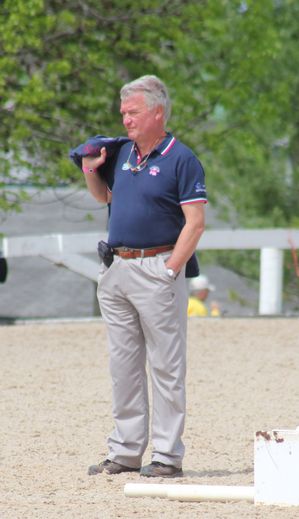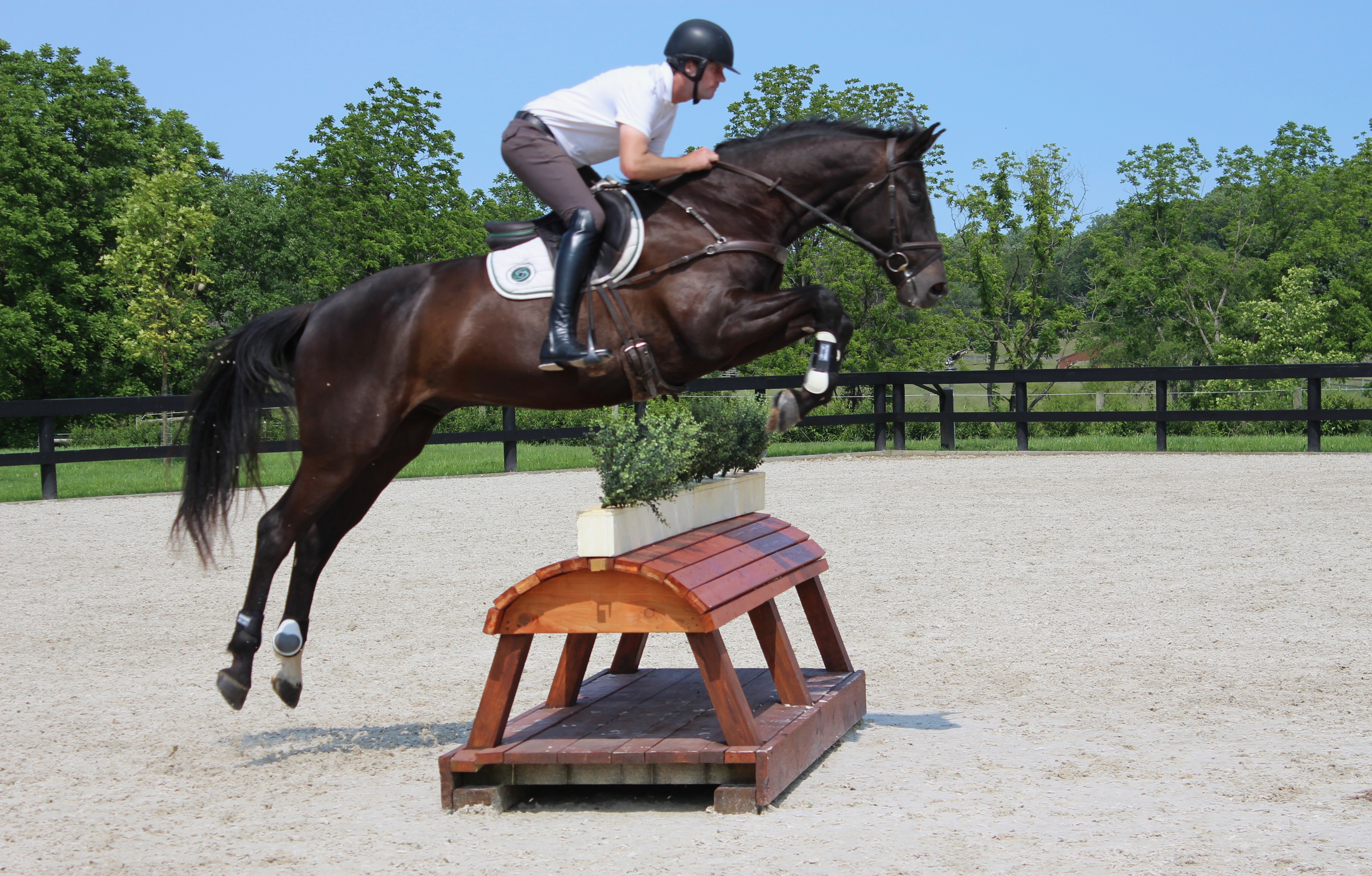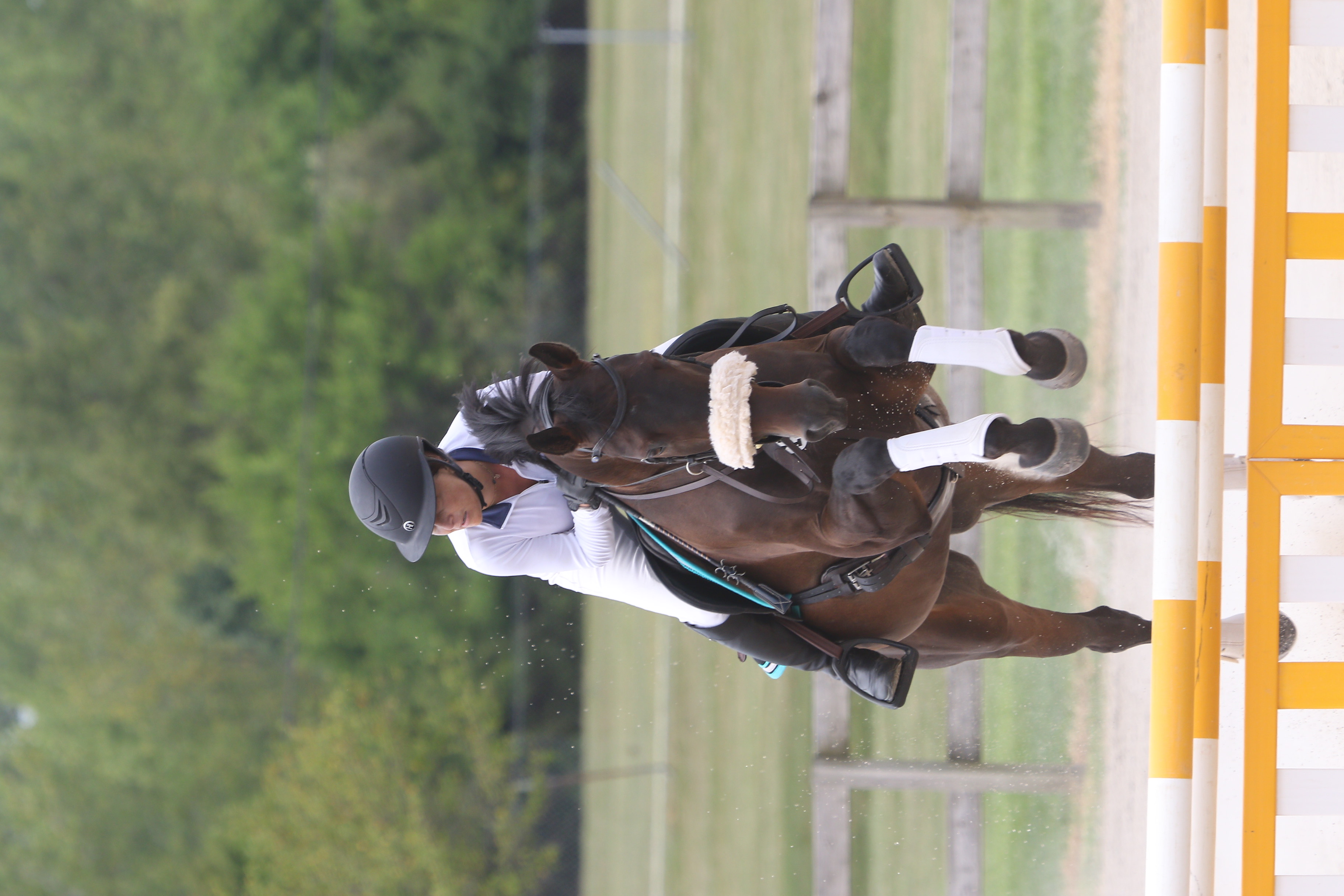I had the immense pleasure of spending some time scurrying after the British Equestrian Federation’s Performance Director, Will Connell during the World Equestrian Games here at the Kentucky Horse Park in Lexington last year, and saw for myself exactly what the job description couldn’t possibly encompass! For starters, although Will’s “day job” is running the World Class programmes for the four Olympic Equestrian disciplines (PDF), (Jumping, Dressage, Eventing and Para), during the WEG he actually took on the role of chef de mission for all eight disciplines.
Incredibly hard-working, with an eye for detail, it must be one of the most exhaustive and exhausting positions in the sport. Will is literally the first of the team personnel to arrive at the venue, and probably one of the last to leave, and once the day’s work is done, more often than not he’ll be at a “working” dinner. When your eye sweeps over the British barns without really taking much in, except that it all looks ship-shape, that’s because Will, and his advance crew have been in there taking care of every last detail, eg. painting the inside of the stalls if they deem it necessary, (they did in Kentucky!), making sure they have the right adapters for the kettle so they can make tea in the “tack room”, leaving absolutely no stone unturned; it’s that kind of OCD that helps win medals!
As wonderful as the World Equestrian Games were for Great Britain last year – the eventers’ team gold and individual silver, the dressage team and individual silver, the vaulting gold, the para gold…and with a wheelbarrow full of medals since he took on the position in October 2003, Will still feels the pressure of living from Championship to Championship,
“Our pinnacle is the Olympic Games, we work on a four year cycle so I suppose that’s where the most likely change would come, but I’m employed full-time, subject to funding continuing, so if the funding stops then my job becomes redundant. I’ll do it for as long as I suppose I still feel I can offer something and they still want me. If it all goes horribly wrong in London, they might decide they don’t want me anymore! People always ask me what I’m going to do after London, and I suppose you always have to wake up after an Olympic Games and think, ‘Can I keep driving this forward for another four years?’ “
I ask Will if the reason he never takes holidays is because he’s just one of those people who genuinely doesn’t enjoy them, and he laughs, and tells me I’m wrong, but this was the man who flew directly from the World Games on an overnight flight to a morning meeting and hit the ground running!
“I don’t like failure. I always try and take a little break each year, but I am quite driven to keep everything moving. I have a lot of very good people who work with me. There’s a performance manager in each of the four Olympic disciplines who look after that discipline, then within each discipline there’s the performance programme -the here and now, then there’s the development programme which is for future athletes/riders, and then we run an equine pathway where we try and identify horses with Championship potential earlier on in their careers. So we run three programmes in the three Olympic disciplines; in the Para’s we don’t run an Equine Pathway because we have people out there trying to identify the right horse for the right rider. There’s a lot of great people out there working with me; we have a very strong team right here in the office, there’s four of us full-time here, and we have quite a good work output!”
Of course, a lot of Will’s work is done outside the office – at competitions & training days; he must have the memory of a RAM chip because he knows little details and quirks about random horses and riders across the board – Pippa Roome, you could be in trouble at next year’s Badminton, I think we may have found you a worthy opponent in the Ultimate Eventing Mastermind, and imagine if we extended it to Greenwich for an Olympic Edition?! In what’s becoming a habit, Will laughs, and tells me I’m wrong, again!
“My memory isn’t as good as it should be, but I’m very lucky that I get to see the sport a lot. I see these horses quite often, which is great, and you remember things about them, but I’m not the expert by any means – that’s the performance managers and the coaches that work with them. Obviously I see the horses compete, and you remember them, especially the top ones, but I’m not that great about remembering nuances about each horse. It’s a team effort, all of us working together, my job isn’t direct contact with the riders and horses, I’m not a coach, never have been and never will be. My job is to manage and lead the programme as a whole, and to make sure that when it comes to things like WEG and the Olympics, the support structure for the team is in pretty good standing.“
This meant that at the last Olympics in Beijing (but Hong Kong for the Equestrian) Will spent 60 days at the venue,
“I think it’s important to get to a Championships as early as possible. It doesn’t matter how good the pre-Championship communication is, there’s always things that have changed slightly, and you need to be on the ground to deal with that, so I like to get there early. The thing with Hong Kong was there wasn’t a huge gap between the Olympics and the Paralympics; by the time we’d sent the last Olympic person home, the advance party were beginning to arrive for the paras, so it was quite a long time.”
Part of the support structure is that all-important Great British Team Spirit, although, I’m wrong again, we don’t call it that…!
“One of the things that we work very hard on is that we don’t call it team atmosphere, but rather team environment. It’s not like in a rugby team or soccer team where players have to pass a ball to each other and understand each other; it’s a collection of individual performances that give us the team result, but it’s important that people feel comfortable within their team environment. For example, if you’ve got someone who likes to sit in their room and read a book then they should feel comfortable doing that, and everyone else should respect them for that being their wish, but if they want to stick together and go swimming together, then that should also be their opportunity to do that.”
” Something else that we work very hard on is what we call the Golden Hour, which is, both for horses and for humans, that first hour, when people arrive, which is another reason I try and get there early. In a major Championships there’ll always be things that go wrong, there’ll always be frustrations, there’ll always be ups and downs in the performance, that’s inevitable; but if you ensure that the arrival process is smooth and comfortable, and everyone’s rooms are ready, the stables are ready, everything’s in the right place, and then before they know it they’re through the airport, in their room, unpacked – it gets everything off on the right foot. So the Golden Hour for us is very important, and the Team Environment, and really you want to get to the point where the riders and the key staff such as coaches, vets etc don’t have to think about anything except doing their job. That’s what we work very hard on. Appearance is important, having a team uniform is important, and other teams do that – look at the Dutch, they do it very well with the Dutch Orange across all their sports. We expect the riders to deliver faultless performances so why shouldn’t we, supporting the riders?”
Next week will be the Test Event for the all-important 2012 London Olympics, and I asked Will about the significance of the competition, and how important the results would be,
“Of course I want them to do well, we’ve got three very good riders going there – William Fox-Pitt, Piggy French and Pippa Funnell. When we went out the Test Event in Hong Kong in 2007, the aim was really to learn as much as possible about what effect the journey and the climate would have on the horses, so we selected the horses. We selected three horses: a very light one, an average weight one, and a heavier one, so that we could look at the effect on the horses, and the riders kind of came with them. Also they were away for quite a period of time, nearly three weeks, so it was difficult to send the top riders out at that time of year, and be away with one 2* horse for that length of time. So the aim for Hong Kong was to gather as much data about the horses. For London, it’s about understanding as much as we can about the venue, about the topography, the hills on the cross country..and so we want the riders who can give us the very best feedback, and hence why we’ve selected top riders. Also it’s good experience for them ahead of next year to have had a spin around the venue.”
“For us, the Test Event is to learn as much as we can about the venue and how it works, and to check out our logistics plan for next year. We also want to give as many people as possible access to the venue to have a look at it, although what we’ll be seeing next week is different, it’s a lot smaller in scale to what we’ll be seeing next year, but I think people will still get a feel for it. We are sending nearly all our World Class riders to observe.”
In between now and the Olympics however, Great Britain has a chance at more medals – the European Championships at Luhmuhlen. Will this be used as a stepping stone for London, or is it important in it’s own right?
“We will try and select, this year, as good a team as we can, but the primary aim is to win next year. A lot will depend on form, soundness, fitness, perceived benefit of going to Luhmuhlen which is primarily a flat course, and Greenwich certainly isn’t, but I have to say the work they’ve done on the going on the cross country course at Luhmuhlen is outstanding, because we were out there a couple of weeks ago and they really deserve credit for it. It may be that the selectors look at giving someone Championship experience ahead of next year, that’s certainly not an impossibility; what they’re not going to do is drag someone up from 23rd on the list to put them in the team to give them a run for next year! They’re going to select from that top group of people, and yet it’s not impossible that conversations might take place with a rider and decisions might be made not to save the horse for next year, but we certainly want to win medals this year too.”
Once again, Will disagrees with me, albeit kindly, (!) when I mention, somewhat wistfully, the depth of talent in Great Britain,
“I think if you look at the Germans, they probably have more depth currently in Eventing, than we have. Certainly we need more depth in show-jumping. In dressage we have four or five very good ones at the top, but I think saying we have depth across the disciplines is perhaps over-stating it a little bit! Like most nations, we have our top group, and we’re a little bit hoping they’re going to stay straight. We do have a lot of great riders in this country but we need the really top horses if we’re going to win medals. In jumping, I think by next year there’ll be ten or twelve teams that will be in with a chance of medals. In Eventing, certainly the competition for gold and silver is going to be very, very tight. In Dressage it’s not just the British, Dutch and the Germans, there are some other nations coming up with some good horses. It’s going to be a really heavy-duty competition next year.”
I ask Will how the Olympics being on home turf will add to the pressure next year,
“I think there will definitely be a home advantage, but I think people also underestimate the disadvantages, and the extra pressure that brings – ask some of the Americans how they felt competing at WEG last year? The pressure from the press will be enormous, and is already cranking up. There’s a lot of extra work that comes with a home competition because I want it to be a successful Games as much as anybody else. The reputation of Great Britain is hanging on it. Our job in terms of the Programme is to help everyone prepare for the pressures we can’t control, and subdue the pressures we can, so we’ve been working on that for a couple of years now: Identify what you can control and control it, and identify what you can’t and learn to deal with it!”
This philosophy has stood Will in good stead in his many travels from show to show,
“People say to me how lucky I am that I get to travel so much, but more often than not you go from the airport, in a taxi to the venue, to the hotel, to the venue, to the hotel, and then back to the airport and away again. I do now try and make a point of seeing something of the local area that I’m in, but I have to say I think there should be two different kinds of airports – one for tourists and one for people on business! It’s fun though, and I’m very privileged, I get to see the top horses and riders in the world in each of the disciplines around the world, mainly Europe. I’d love to go to Wellington, for the Winter Equestrian Festival, I’ve never been down there, and I’ve never been to Australia or New Zealand and I’d love to go and watch some eventing over there because they’ve produced some such great riders, it would be great to go and see.”
So when he looks back on his tenure so far, what are his happiest memories of the job, I wonder?
“I think some of the results last year at WEG for Britain were amazing, and funnily enough, if I had to single one out, I’d say Joanne Eccles in the vaulting. Vaulting doesn’t get the funding that the Olympic disciplines and the paralympics do, and the Eccles family had a four year plan and it worked. When you see it all going well, and you see people winning it’s a great feeling. It’s also a great feeling when you come back and everything that you’ve organised has gone well; I think that our plan worked well last year, in difficult circumstances sometimes, and that’s a pretty good feeling. Then there’s been amazingly good, fun evenings and moments with people which have been either very rewarding, or very amusing, and I’ve met a great bunch of people, and I’ve had one or two dinners that have just been nights of laughter!”
Finally, I ask Will, or perhaps I plead with him, what plans does he have for the day after the Olympics next year? Surely a holiday, right? Escape somewhere?
“If it’s gone well I’ll be trying to work out how we can replicate that in Rio, and if it’s gone not so well, I’ll be trying to work out what we need to do better. The Rio planning has started already though, I had my first visit there in March, so that’s underway, and I go again in November.”
Will is making me nervous that I’m wasting his time, even though he’s been incredibly polite and patient with me. Apart from refusing to take credit for anything in a rather typical British manner, (which I’m sure he’d disagree with me!) he’s been an absolute pleasure to talk to; I’d like to thank him very much for his time, and wish all of Team GB continued success at the Europeans, but most importantly in London next year. Thank you as always for reading. Go GB and Go eventing!


























